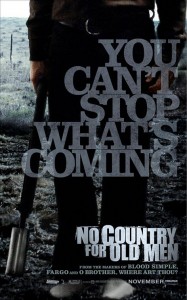#11. No Country for Old Men (2007)
(directors: Joel & Ethan Coen; starring Josh Brolin, Tommy Lee Jones and Javier Bardem)
 When I first saw it I was convinced I was watching one of the most important cinematic achievements within the past decade. The ending in particular had audiences gasping in disbelief… not because of any outrageous last-minute plot twist, but because they couldn’t believe the Coens would choose to end the movie with the villain getting away and then a character describing a clearly symbolic dream, no resolution or catharsis offered whatsoever. Needless to say I went on a hunt to decipher Tommy Lee Jone’s final monologue as well as the implications presented by the rest of the film, and eventually I had to come to the conclusion that while there’s a lot of food for thought offered, I’m not completely convinced the Coen brothers fully understood their source material (for one, it would suggest the movie is really about Tommy Lee Jones’ character’s regret of his indifferent response to a world filled with evil, but no one watching the film for the first time without having read the source novel by Cormac McCarthy would have been likely to deduce that at all given the emphasis on the Llewellyn Moss/Anton Chigurh chase). Nevertheless it’s hard not to be left with a very strong impression even after several viewings, the direction and especially the sound design all extremely powerful, an absence of any soundtrack becoming a haunting presence. (Or is there none? Listen very closely to a few key scenes…) Turn the volume up while watching the second hotel scene, it’s only a character sitting in a dark room but the tiniest of sound effects happening outside create unbelievable tension. No Country is a very methodical film, spending numerous reels of film watching the characters construct simple plans or devices in order to stay one step ahead of the other. While this might be a turnoff for some viewers (especially those squeamish not wanting to watch the entire process of dressing a wound) it fits the tone of the material quite well, emphasizing that narrative outcomes occur less through dramatic scenes of spontaneous choice but from the mundane, instinctual necessities of survival. The Coens had appeared to be running thin on ideas after their masterworks of the mid-to-late nineties, but after a couple of disappointing releases followed by a three year hiatus they came back in full force with this picture and it appears they’ve had a second wind creatively as their 2008 and 2009 films have not been short of praise either (although I’ve yet to see A Serious Man for myself).
When I first saw it I was convinced I was watching one of the most important cinematic achievements within the past decade. The ending in particular had audiences gasping in disbelief… not because of any outrageous last-minute plot twist, but because they couldn’t believe the Coens would choose to end the movie with the villain getting away and then a character describing a clearly symbolic dream, no resolution or catharsis offered whatsoever. Needless to say I went on a hunt to decipher Tommy Lee Jone’s final monologue as well as the implications presented by the rest of the film, and eventually I had to come to the conclusion that while there’s a lot of food for thought offered, I’m not completely convinced the Coen brothers fully understood their source material (for one, it would suggest the movie is really about Tommy Lee Jones’ character’s regret of his indifferent response to a world filled with evil, but no one watching the film for the first time without having read the source novel by Cormac McCarthy would have been likely to deduce that at all given the emphasis on the Llewellyn Moss/Anton Chigurh chase). Nevertheless it’s hard not to be left with a very strong impression even after several viewings, the direction and especially the sound design all extremely powerful, an absence of any soundtrack becoming a haunting presence. (Or is there none? Listen very closely to a few key scenes…) Turn the volume up while watching the second hotel scene, it’s only a character sitting in a dark room but the tiniest of sound effects happening outside create unbelievable tension. No Country is a very methodical film, spending numerous reels of film watching the characters construct simple plans or devices in order to stay one step ahead of the other. While this might be a turnoff for some viewers (especially those squeamish not wanting to watch the entire process of dressing a wound) it fits the tone of the material quite well, emphasizing that narrative outcomes occur less through dramatic scenes of spontaneous choice but from the mundane, instinctual necessities of survival. The Coens had appeared to be running thin on ideas after their masterworks of the mid-to-late nineties, but after a couple of disappointing releases followed by a three year hiatus they came back in full force with this picture and it appears they’ve had a second wind creatively as their 2008 and 2009 films have not been short of praise either (although I’ve yet to see A Serious Man for myself).
Comments